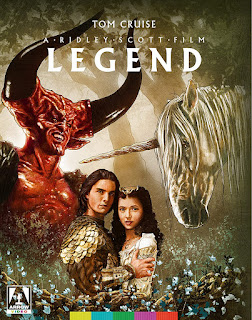Legend
Truth is, Legend is simply a beautiful mess.
The unapologetic fairy tale begins with nature boy Jack (Tom Cruise) introducing Princess Lili (Mia Sara) to the magical wonders of his forest domicile, including a pair of unicorns. But Lili’s naïve mistake leads to an opportunity for Darkness (Tim Curry) to steal the unicorn’s power – and Lili herself - plunging the world into a snowy apocalypse. Meanwhile Jack, with the help of his fairy friends, heads off on a quest to right what’s been wronged.
Scott’s lush visuals forgo the usual Frazetta-inspired imagery and embrace a medieval aesthetic that’s uniquely his own. The production design alone makes the film worth watching more than once to pick up on all the details. And Rob Bottin’s make-up effects to turn Tim Curry into a towering vision of Satan remains the film’s one true timeless achievement…and that terrifying swamp witch ain’t bad either!
Technically, Legend is a masterpiece. But the story is peculiarly tone deaf, swinging wildly between children’s fare and more adult themes. Cruise is fully committed but largely wasted in a movie that’s completely dominated by the scenes between Curry and Mia Sara. Even Scott’s attention seems more focused on the demonic seduction, staging a virtuoso dancing sequence where Lili embraces her dark side. If it’s true that every film should judged by the quality of its villain, Legend is the exception that proves the rule.
Besides a brand-new 2K restoration of the Theatrical Cut, Arrow Video’s special edition also includes the extended director’s cut tons of new extras including two commentaries, isolated score tracks, all-new behind-the-scenes featurette, Ridley Scott’s episode of The Directors, archive documentaries and promotional featurettes, deleted scenes, storyboards, two version of the script and an essential visual essay that breaks down the three existing version of the film and its competing scores. At this point of home video history, re-purchasing a film like Legend is only worth it if a company brings something new to the table…and, damn, if Arrow hasn’t done that in spades!




Comments
Post a Comment